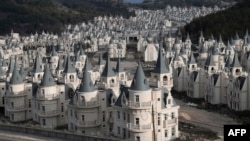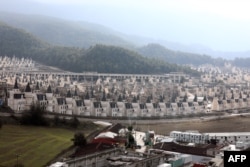Deep in a provincial region of northwestern Turkey, it looks like a mirage — hundreds of luxury houses built in neat rows, their pointed towers somewhere between French chateau and Disney castle.
Meant to provide luxurious accommodations for foreign buyers, the houses are however standing empty in what is anything but a fairy tale for their investors.
The ambitious development has been hit by regional turmoil as well as the slump in the Turkish construction industry — a key sector — as the country's economy heads towards what could be a hard landing in an intensifying downturn.
After a long period of solid growth, Turkey's economy contracted 1.1 percent in the third quarter, and many economists expect it will enter into recession this year.
The country has been hit by high inflation and a currency crisis in August. The lira lost 28 percent of its value against the dollar in 2018 and markets are still unconvinced by the readiness of the government under President Recep Tayyip Erdogan to tackle underlying economic issues.
The villas close to the town center of Mudurnu in the Bolu region are intended to resemble European architecture and are part of the Sarot Group's Burj Al Babas project.
But the development of 732 villas and a shopping center — which began in 2014 — is now in limbo as Sarot Group has sought bankruptcy protection.
It is one of hundreds of Turkish companies that have done so as they seek cover from creditors and to restructure their debts.
Driving force
Sarot Group filed for bankruptcy protection after some of their Gulf customers could not pay for the villas they had bought as part of the $200 million (175 million euros) project, Sarot's deputy chairman, Mezher Yerdelen, said.
So far, $100 million has been spent on the project.
"Some of the sales had to be cancelled," Yerdelen told AFP, after the company sold 351 villas to Arab investors.
The villas are worth between $400,000 and $500,000 each. They were designed with the Gulf buyers in mind, architect Yalcin Kocacalikoglu said.
While the drop in oil prices hurt its Gulf customers, Sarot Group was also hit by "the negative impact of the economic fluctuations on construction costs" in Turkey, Yerdelen said.
Despite a legal battle over its bankruptcy status, Yerdelen said the company can continue making sales and that he hopes the project will be inaugurated in October 2019.
Yet the Al Babas project is hardly alone. Unfinished and empty housing projects are strewn across the country, testimony to the trouble the construction sector, and the wider economy, now finds itself in.
The construction sector has been a driving force of the Turkish economy under Erdogan, who has overseen growth consistently above the global average since he came to power in 2003.
But the sector contracted 5.3 percent on-year in the third quarter of 2018.
"Three out of four companies seeking bankruptcy protection or bankruptcy are construction companies," said Alper Duman, associate professor at Izmir University of Economics.
Turkey's 'locomotive'
"Whether we call it a construction bubble or a housing bubble, there is a bubble in Turkey," he said.
He pointed to unsold housing stock as the main indicator of this, with data showing in that over the past 16 years 10.5 million apartments have been built but only eight million have been approved for use.
"There is a high risk this bubble will burst," he said.
Trade Minister Ruhsar Pekcan said in mid-December that 846 companies had applied for bankruptcy protection since March 2018 but opposition daily Sozcu claimed in October the figure was more than 3,000.
Turkish Chamber of Civil Engineers head Cemal Gokce expressed pessimism, predicting "more bankruptcy protection applications, bankruptcies" among construction companies.
He said too many homes have been built in Turkey.
And most are not luxury villas like Burj Al Babas with its style reminiscent of the Sleeping Beauty Castle at Disney theme parks, but simple apartments and homes for ordinary Turks.
The construction confidence index of the Turkish Statistical Institute (TurkStat) fell 2.1 percent in December to 55.4, after 56.6 in the previous month. Anything below 100 indicates a pessimistic outlook.
However, Kerim Alain Bertrand, who previously headed up a firm that provided and analyzed data on Turkey's real estate market, said recently he was more optimistic, partly due to the country's growing population.
"The construction sector is this country's locomotive sector," he said.
While there will be a consolidation in the sector, it will "continue to be kept alive" by the young population, he added.
The median age of the population in Turkey was 31.7 in 2017, according to TurkStat, compared to 42.8 in the European Union.

